- Home
- Donald Hamilton
The Steel Mirror
The Steel Mirror Read online
Donald Hamilton
The Steel Mirror
chapter ONE
He came back from the railway station with his tickets through the hot late afternoon sunshine; and at the door of the Ford garage he had to step aside for a fawn-colored Mercury convertible just driving in. He caught a glimpse of the face of the girl behind the wheel, rather slight and fragile beneath a hat that turned back from her forehead in a ruffled halo of pale straw. The hat had a veil that covered but did not conceal her face, and a large stiff black bow at the rear. The car had Illinois license plates, a Chicago sticker, and smelled strongly of boiling alcohol. It had, apparently, been driven hard; and something of the conjunction of the small face, the delicate veiled hat, and the overheated car fifty miles away from home, seemed incongruous to John Emmett; and, inside the garage, he walked very slowly toward the office door, waiting for the girl to get out so that he could get a full look at her.
“Please,” he heard her say to the mechanic who came up. “It keeps boiling.”
The mechanic raised the hood. “You’ve still got your antifreeze, haven’t you, Miss?”
She said, “Oh, is that it? Can you fix it?”
“Just drive it over the pit,” the mechanic said. “I’ll clean it out for you.”
The car jerked forward, backed, went forward again; the mechanic beckoning, waving, finally halting it with his hand. “Better let me do it, Miss,” he said, coming forward.
The girl laughed uncertainly. “I guess you’d better. I can’t seem to make it fit.”
Then she got out and brushed at the rear of her pale gabardine suit, and stood watching the mechanic put the car into place with two expert movements; the girl standing there slender and rather small in the dusk of the grimy garage, in the fragile hat and the expensive light suit. She was wearing white gloves and carrying a large rectangular black purse on a strap over her arm. The stockings on her fine legs were obviously nylon, and she was wearing dark pumps with moderately high heels.
All that cost and careful preparation, John Emmett thought, frowning, as for a cocktail party; standing a little stiff and cramped, a little crushed in the rear, with perspiration on her forehead and upper lip, beside an overheated car in a dirty garage in Jepson, Illinois. It was really none of his business, and he started to turn away.
“Please,” the girl asked the mechanic, “have you any roadmaps?”
“See the man in the office, Miss.”
Emmett held the door open for her as she came up, and followed her into the office.
“I’d like one of Illinois and one of Iowa,” she said, “and if you’ve got a big one that shows…”
Emmett grinned at her. “The guy over there,” he said.
She flushed a little, seeing the camera, like a badge proclaiming him a tourist, slung over his shoulder. “Oh, I’m sorry, I thought…”
The man in the corner pushed a map across the counter. “All we’ve got is Illinois,” he said.
“Oh,” she said, “well…”
“Try the Standard station up the street.”
Emmett had gone behind the counter where his suitcases stood, with his fishing-rod case, between the shelves of automobile accessories. He hesitated a moment and raised his head.
“I’ve got some in my car,” he said.
The girl turned, her gloved hand on the map on the counter. “Thank you,” she said politely, “thank you, but I can…”
“I won’t need them,” he said, and grinned wryly. “It’s not really my car any more. It kind of disintegrated about ten miles east of here. I just sold what was left of it.” As the girl looked at him he was suddenly glad that he had changed, in preparation for catching the eight o’clock train, from the dirty slacks and sports shirt in which he had been driving. He could see himself in the spotted plate-glass windows, looking not particularly young or handsome or athletic, or even, he thought, particularly intelligent, but quite respectable. “I’ve got the whole works,” he said. “Clear to the coast. You’re welcome to them. They’re no good to me without a car.”
“It’s very nice of you,” she said. “If you’re sure…”
He shrugged his shoulders. As they walked back into the garage he asked, “How far are you going?”
“Well,” she said, “not quite as far as the coast.”
He asked, smiling, “You wouldn’t like a passenger?”
She laughed, glancing at him, and said, “I don’t think so. I’m sorry.”
He opened the door of the ancient Ford with the D.C. plates that had been hauled away into the rear of the garage, and took the maps from the glove compartment.
“Thank you very much,” the girl said, receiving them. “I’m sorry about your car.”
He knew that she was really apologizing for the fact that she could not quite see her way clear to inviting a strange young man to ride with her, but he kicked the front tire of the Ford ruefully.
“And I just put new rubber on the thing,” he said. “Four new tires.”
“Can’t they fix it?”
“Oh, yes,” he said bitterly. “For a few hundred they’ll put in a new motor which might get here three weeks from now, overhaul the transmission and rear end, and for another fifty-something, they’ll beat the dents out of the fenders and throw in a paint job and simonize. By the time they got through I’d have to grab a plane to get to Bakersfield in time.” He grimaced. “I was going to spend a month seeing the country between jobs, but I guess I’ll just have to try a dude ranch I know, instead.”
As he talked, he found himself trying to introduce himself and at the same time make the girl feel a little sorry for the poor man whose vacation plans had broken down. Yet he was aware that she could not help him: he could hardly expect her to chauffeur him through the Rocky Mountains, and he was quite able to pay the train fare to wherever he wanted to go. So that, in the last analysis, he was not really talking about transportation at all, but about the two of them and the fact that he was curious about her and wanted to find out what brought her, dressed as she was, into this little town looking for roadmaps of Iowa and points west. He was, in other words, quite simply trying to pick her up. The realization startled him.
“Well,” he said shortly, “I think you’ll find all you need there. I’d better get my gear over to the railway station before somebody walks off with it.”
“Is there any clean place in town to eat?”
“I really wouldn’t know,” he said, and her face contracted a little at his brusqueness. Suddenly he understood that she was asking him to ask her to eat with him so that they could talk this matter over further; it was still not quite closed. She was actually considering it. He found himself a little startled. “I’m sorry,” he said. “I’ve never been here before. Suppose I ask.”
“If you would.”
He came back to the office door after a moment, shoving the camera case back with his elbow.
“He says the truck drivers eat at the Elite, and the flossy place is called Parsons’.” He did not step across the sill, making his report through the open door, so that she would not think he was assuming he had permission to accompany her.
“Well,” she said uncertainly, “what would you—?”
“If you’re going alone,” he said carefully, “I’d suggest Parsons’; but if you don’t mind my company, the Elite probably has better food cheaper.”
She smiled very quickly. “But you don’t think I’d be safe there, alone?” There was a little mischief in her voice.
“Safe like a church,” he said, grinning, “but you might feel kind of conspicuous.”
He saw her glance down at her suit, and from the way she flushed he knew that she was aware of being overdressed for the Lincoln High
way. “Well,” she said, “if you’re really…”
“I haven’t had a bite since noon,” he said.
He was aware of her beside him as they came out into the sunlight, but he did not dare look at her directly for fear she would misinterpret his glance as either familiarity or curiosity.
“I don’t know your name,” her voice said, as if she were a little surprised at finding herself walking down a hot sidewalk in a strange town in Illinois beside a man whose name she did not know.
“Emmett,” he said, “John Emmett.”
“Where are you from, Mr. Emmett?”
“Washington, D.C.”
“Did you work in Washington?”
“Yes,” he said. “At the F.R.L.”
“F.R.L.?”
“Federal Research Laboratory.”
They turned into the Elite restaurant which had three men parked with their rear ends thrust out in identical postures from the battered swivel stools by the counter; a table held four more talking deliberately over their coffee. A middle-aged couple by the window looked a little out of place. The men looked up, not all at once but taking turns at it, as Emmett and the girl came in; those with their backs turned, making the movement casual, as if they had turned to spit on the floor behind them and had just happened to notice the girl. Their faces made no comment, and after the last of them had had his look you could feel them carefully taking up where they had left off, eating and talking, but there was a sudden sense of male awareness throughout the room.
The girl selected a table and sat down, started to remove her gloves and stopped, looking at them, and grimaced. They were a little soiled. She stripped them and turned back her veil, and he saw her face for the first time without interference. It had wide, arched eyebrows, a small, straight nose, and a firm, rather pointed, chin. He watched her as she felt of the earrings like small gold blossoms with pale blue stone centers, which matched the spray of three such blossoms on a gold stalk that was pinned to her lapel. She glanced up, catching him watching her; and, perhaps to help him cover his confusion, rubbed her eyelids with the tips of her fingers.
“Remind me to buy some aspirin on the way back,” she said.
“Headache?”
She nodded. “It was kind of glary.”
“Come far?”
“Only from Chicago,” she said. “But I didn’t have any sunglasses. I’d better get some of those, too.” Then, quickly, before he could ask the logical next question, where she was going, she said, “But you’re unemployed at the moment.”
“Oh,” he said. “Yes, the axe.” He grinned. “Well, I suppose it’s fair enough. The other guy has the job back, and I’ve got the experience I gained while he was in the service.”
“Oh,” she said. “Then you weren’t…?”
“No,” he said, and wondered angrily, as always, why the answer to this question always made him feel small and embarrassed. “No, I wasn’t,” he said. “I went to Washington right after Pearl Harbor. The rest of the war, as far as I was concerned, was a duel between the Bureau and my draft board. The Bureau won. It didn’t really matter, because if I’d been drafted they’d have had me ordered right back to F.R.L., anyway.”
“If they wanted to keep you so badly, you must be a pretty good whatever-you-are,” the girl said, smiling.
“Chemist,” he said, and laughed. “But it doesn’t necessarily follow. No government bureau is going to admit that any man working for it is not absolutely irreplaceable.”
The waitress came up and gave them menus and water and said that the lamb was all gone. When they had ordered they sat in silence for a while, and the girl turned her head to look at the sign over the cash register: In God We Trust—all others pay cash. As the light changed on her face, Emmett saw the small scar on the left side of her mouth, just at the lip; noticing it because her fingers had come up absently to touch it and because she was too pretty a girl to be marred in any way. Suddenly she was looking at him, snatching her hand away, and he knew that he was flushing. The scar was no more than a faint white mark, but he knew that his staring at it had been unforgivable.
After a long time her voice said, “I… was in an accident. I haven’t quite got used to it yet. I keep wanting people to tell me it doesn’t show.”
She had opened her purse to look at herself, smiling at him a little apologetically over the edge of it.
He said carefully, “I didn’t notice. Until you touched it.”
“Thank you,” she said, closing the purse and laying it aside so the waitress could put the plates down. Then, looking up again quickly, she asked, “Do you mind driving at night, Mr. Emmett?”
chapter TWO
In the car, he sat smoking beside her, trying not to look at her because she had turned out to be a very bad driver, and he could not trust himself not to give advice. It was easy to see why she might have wanted somebody to help her get to wherever she was going. He sat watching the sun go down toward the rolling country to the west, and told himself that nothing could very well happen to you at forty-five. Behind him, his suitcases bounced together uneasily on the floor, and his hat and light topcoat kept company with her purse on the small rear seat of the convertible. Washington seemed much farther away than four days and eleven hundred miles. Gradually, in spite of the girl’s driving, he felt the sense of freedom return that had been lost to him for a while after the Ford broke down. He felt also a small pleasant sense of adventurousness and anticipation.
He laughed abruptly, and the girl glanced at him.
“I forgot to cash in my tickets,” he said.
“Oh,” she said, “I didn’t know you’d bought…”
“I’d just come back from getting them,” he said.
He saw that she was frowning a little, and realized his error: she was thinking back over what had been said and remembering that he had only asked once, lightly, perhaps as a joke. He saw the color come into her face.
He said quickly, “I don’t like trains. I rode too many of them during the war. When I heard you ask for roadmaps of Iowa and points west…”
“But it’s better now, isn’t it?” she asked after a pause. “I mean, the trains.”
“Yes,” he said, a little dryly. “There aren’t so many uniforms.” After a while, she not speaking, he said slowly, “You see, I had two brothers, both older. They were both killed, Dave at Kasserine Pass, and Howie when the Lewistown went down off Savo. It made being a civilian kind of, shall we say, awkward. I got kind of allergic to uniforms, not having one myself.”
He sucked at his pipe and knocked the dead coals into his hand and threw them out the window beside him without looking at her. The windstream snatched the ashes away from him.
“I’m sorry,” the girl’s voice said.
He said, “It was a stupid reaction. After all, Washington was full of civilians. But I didn’t really feel the war was over until I loaded my stuff into the car last Wednesday and headed out. But getting on a train would have kind of spoiled it, don’t you see? So when I heard you ask for roadmaps I thought it was worth a try.”
She was silent for a while. He glanced at her. The blue stones in the small gold blossoms on the lobe of her ear and on the lapel of her jacket caught the light through the windshield; and the wind through the open window beside her, sweeping through the car, tugged at the veil she had turned back, at the brim of her hat, at the wisp of hair that had come free at her temple, and at one point of the collar of the thin eggshell-colored satin blouse that showed in a small triangle, between the lapels of her jacket, at her throat. She turned her head briefly to look at him through the sunglasses that looked a little strange with the rest of her costume.
“Incidentally, my name is Ann Nicholson, Mr. Emmett,” she said, smiling abruptly.
He laughed. “Yes. I looked at the registration card.”
After a moment she laughed also. He realized with a small shock that she had, briefly, been wondering if he had recognized her. He glanced at
her again, but her face aroused no recollection in his mind. He was quite sure he had never seen her before, or even a reasonable portrait of her. He thought he would have remembered.
“I’m going to Denver,” she said, “if that helps you.”
“Denver’s fine,” he said. “I’ve got reservations for three days at a place on Hogback Lake, back in the mountains. If Mrs. Pruitt’s still running it, I can probably talk her into letting me stay longer.” The girl did not say anything, preoccupied with driving, and after a while he asked, “Do you know the country around Denver?”
She shook her head. “No. No, I’ve never been west before.”
“It’s fine country,” he said. “We used to drive out every summer. Howie had an old Dodge he had tied together with baling wire and rubber bands. I think we covered every national park west of the Mississippi.”
She started to speak, but a string of cars held back by a large truck bore down on them and claimed her attention; and when they had the road to themselves again she had, apparently, forgotten what she had been about to say. Emmett wondered if she, like himself, was thinking of how it had been simple and pleasant before the war—although probably not quite as simple and pleasant as it seemed in retrospect. But the war had shown you things about yourself and about other people that you would rather not have learned. Everything you did now was colored by what you had learned during the war.
Presently Ann Nicholson braked abruptly and swerved into a filling station, while the car that had been behind them whipped past with its horn screaming. The girl looked after it a little resentfully as it receded along the highway.
“Oh, damn,” she said wearily. “I always do that. But he doesn’t have to make such a fuss about it.”
Emmett looked at her drawn face as the convertible came to rest beside the pumps, and he opened his mouth to suggest that she let him drive.
“That sun’s pretty bad, isn’t it?” he said instead. He did not want to frighten her by seeming eager to seize control of her car.
She removed her colored glasses and rubbed her eyes. “Yes, but it will be down in a little while.” She turned as the attendant came to her window, and gave him a key from the glove compartment. “Fill it, please.” Then she opened the door and got out. “Can you reach my purse?” she asked Emmett.

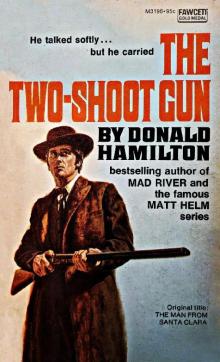 The Two-Shoot Gun
The Two-Shoot Gun Mad River
Mad River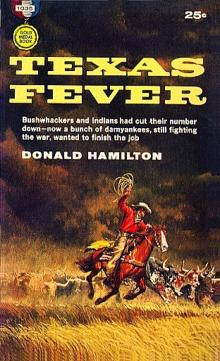 Texas Fever
Texas Fever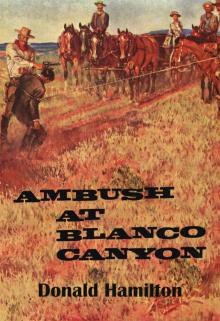 Ambush at Blanco Canyon
Ambush at Blanco Canyon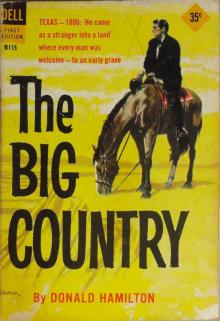 The Big Country
The Big Country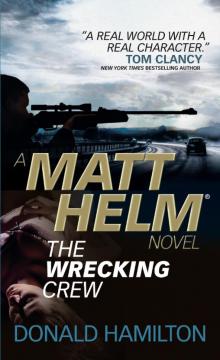 The Wrecking Crew
The Wrecking Crew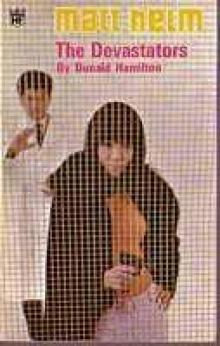 The Devastators mh-9
The Devastators mh-9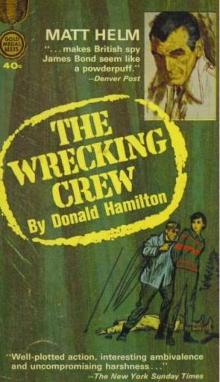 The Wrecking Crew mh-2
The Wrecking Crew mh-2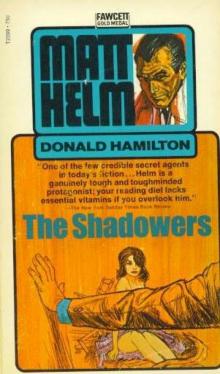 The Shadowers mh-7
The Shadowers mh-7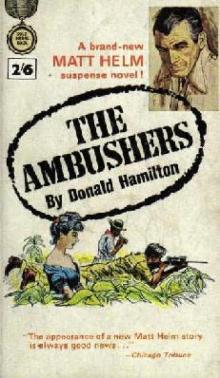 The Ambushers mh-6
The Ambushers mh-6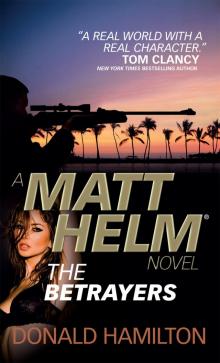 The Betrayers
The Betrayers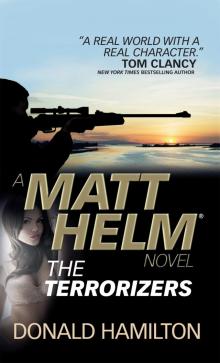 The Terrorizers
The Terrorizers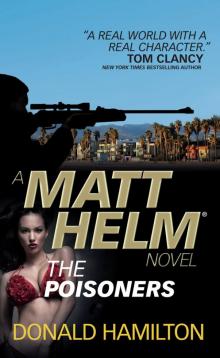 The Poisoners
The Poisoners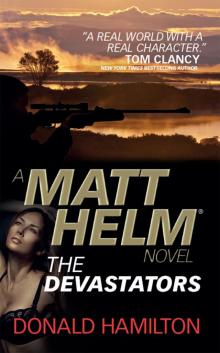 The Devastators
The Devastators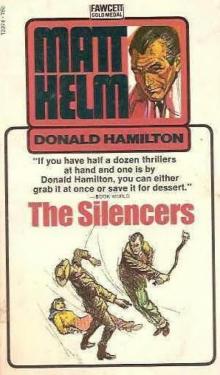 The Silencers mh-5
The Silencers mh-5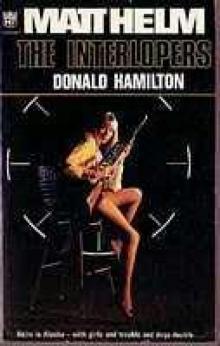 The Interlopers mh-12
The Interlopers mh-12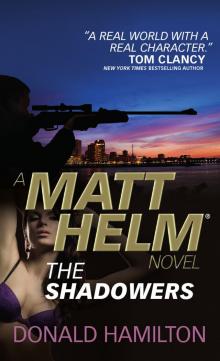 The Shadowers
The Shadowers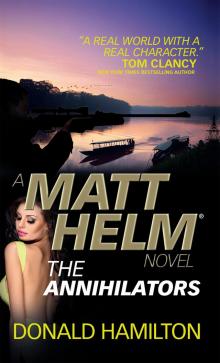 The Annihilators
The Annihilators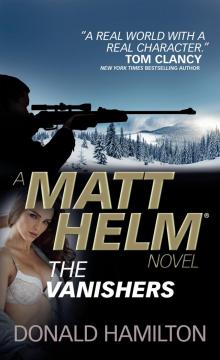 The Vanishers
The Vanishers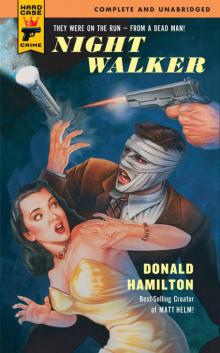 Night Walker
Night Walker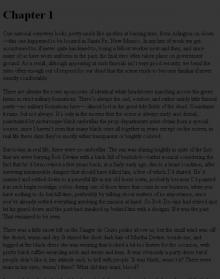 The Revengers
The Revengers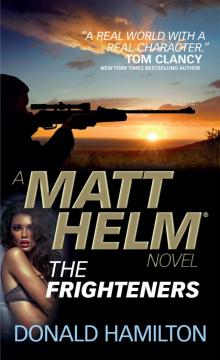 The Frighteners
The Frighteners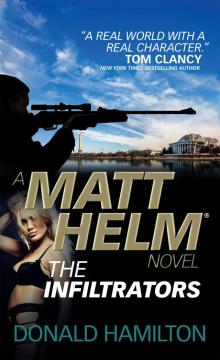 The Infiltrators
The Infiltrators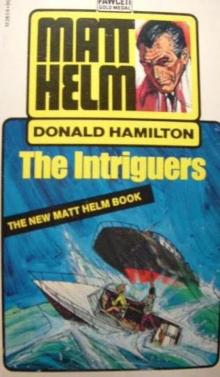 The Intriguers mh-14
The Intriguers mh-14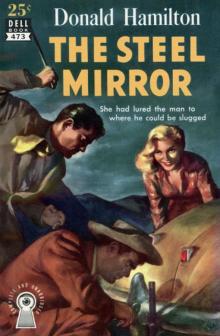 The Steel Mirror
The Steel Mirror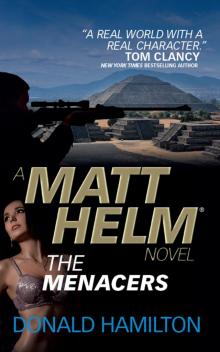 The Menacers
The Menacers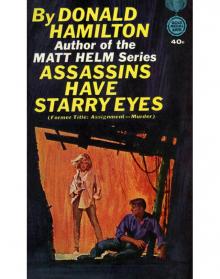 Assassins Have Starry Eyes
Assassins Have Starry Eyes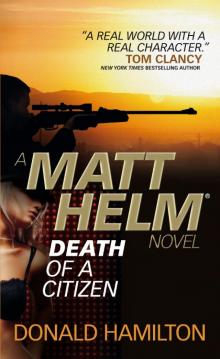 Death of a Citizen
Death of a Citizen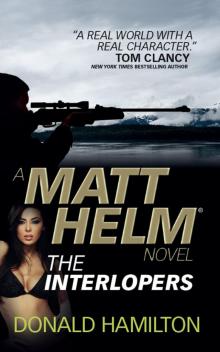 Matt Helm--The Interlopers
Matt Helm--The Interlopers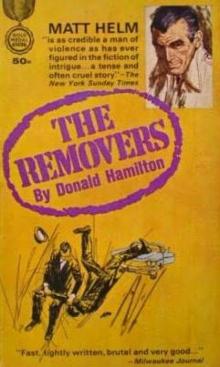 The Removers mh-3
The Removers mh-3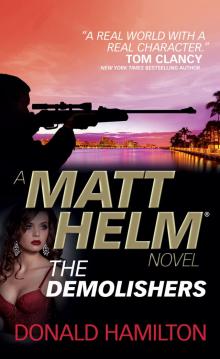 The Demolishers
The Demolishers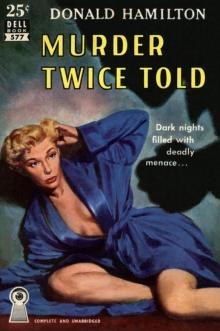 Murder Twice Told
Murder Twice Told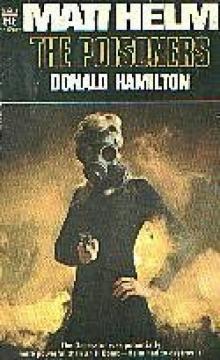 The Poisoners mh-13
The Poisoners mh-13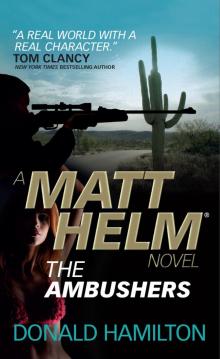 The Ambushers
The Ambushers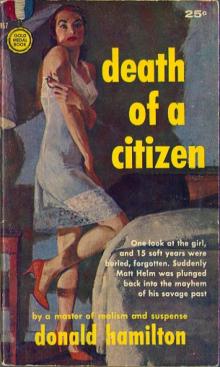 Death of a Citizen mh-1
Death of a Citizen mh-1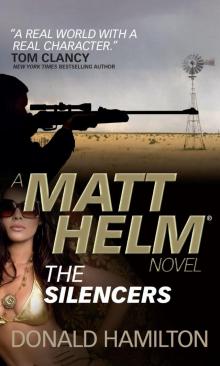 The Silencers
The Silencers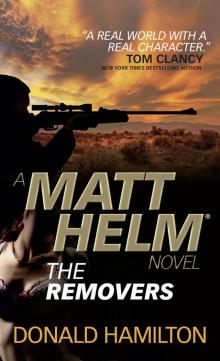 The Removers
The Removers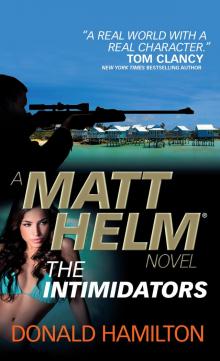 The Intimidators
The Intimidators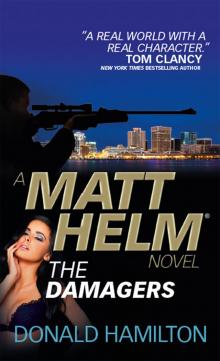 The Damagers
The Damagers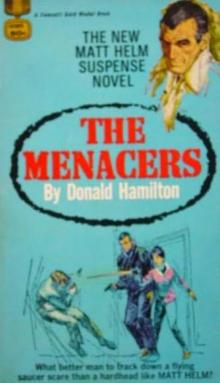 The Menacers mh-11
The Menacers mh-11 The Retaliators
The Retaliators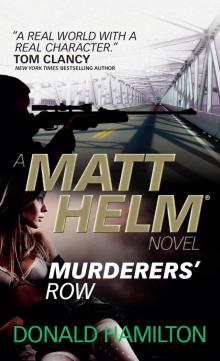 Murderers' Row
Murderers' Row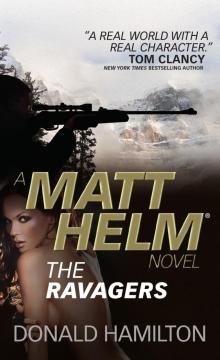 The Ravagers
The Ravagers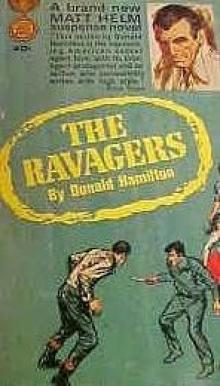 The Ravagers mh-8
The Ravagers mh-8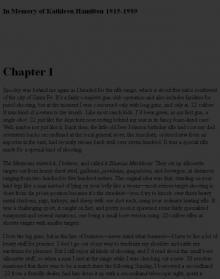 The Threateners
The Threateners The Betrayers mh-10
The Betrayers mh-10